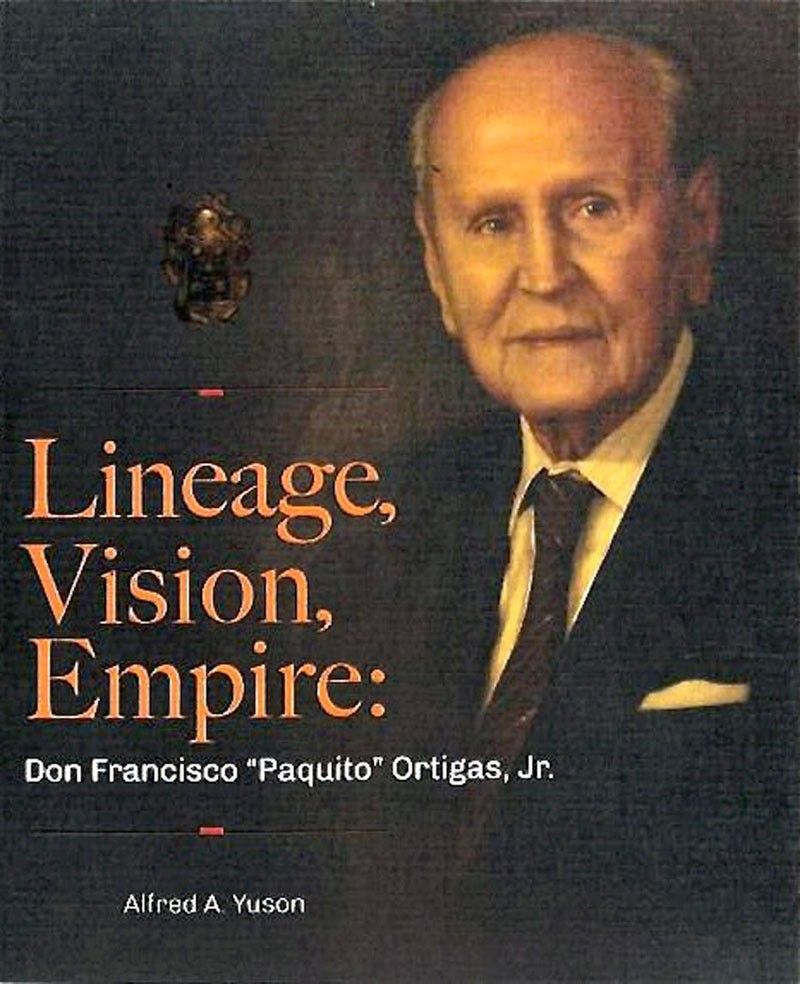Writing an illustrious man’s biography


Lineage, Vision, Empire: Don Francisco “Paquito” Ortigas, Jr., a 176-page biography in coffeetable-book format, was launched on Nov. 10 at the Palawan Room of Shangri-La EDSA Hotel at Ortigas Center, Mandaluyong.
Significantly observed was the birth anniversary of the book’s subject. Copies had already been delivered by House Printers Corp. as early as February this year, but Fernando M. “Nando” Ortigas favored patience in waiting for his father’s birth anniversary to honor him.
On the Acknowledgment page, Nando wrote, by way of dedication:
“Rare are sons who surpass the greatness of their fathers. Such a one was Don Francisco “Paquito” Ortigas, Jr. Krip Yuson’s narrative of Don Paquito’s accomplishments has raised the bar.
As one of his sons, I can only find one solution in trying to surpass the greatness of my father. I can make sure the Filipino people read about his life.”
“Chapter 1: Gentlemen of Ability” takes the long view with its opening passages:
“Modern empires are created out of a vision. They do not involve countries or continents anymore, albeit geography still plays an essential role. It is business that dictates the initiative and the momentum; it is business sense that propels a plan to an ultimate success story of the first magnitude.
“Business empires straddle the intersections of heritage, fate, resolve, determination, administrative acumen and good fortune. All over the world, these financial fiefdoms have flourished with the obverse decline of national empires.”
Here’s hopping through more excerpts:
“Generations have that inimitable way of transposing what was initially foreign landscape to one that spelled home. And betterment of home was what propelled forbears and scions alike to make something of their chosen environment.
“In the Philippines, the bywords for financial development include, predominantly, a roster of former expatriates that lent their genes and expertise to the land they now chose to live in, and decided to try to make better.
“Many are the stories, nay, legends, which enrich our national narrative. And they revolve around the movers and shakers, who by dint of demographic placement, inheritance and fortune, succeeded in transforming backwater or marshland, boondock or scraggly plain, to something that now demands further care and attention — for what they contribute to the national economy.
“Such has been the fate, for instance, of the Ortigas clan.”
The historical background involving the Ortigas forebears goes all the way back to 1861, when a ship from Spain arrived in the port of Manila, bearing an Army Captain and Commander from Madre España: 32-year-old Ignacio Ortigas y Blanc, who was eventually stationed in Porac, Pampanga.
A generation later, Don Paquito’s father, Francisco Ortigas, Sr., known as Don Paco, built a reputation as a brilliant lawyer. Among his closest friends was Manuel L. Quezon, who was to become President of the Philippines during the Commonwealth period. Another was Vicente Madrigal, with whom he became business partners.
Don Paco’s venture into real estate led to the purchase of Hacienda de Mandaloyong, a property that covered an area of over 4,000 hectares spanning what are now Mandaluyong, San Juan, Pasig and Quezon City.
Upon his father’s demise in 1935, Don Paquito took over Ortigas & Company at the age of 30, after he had already shown excellence in sports and oratory in his school days in De La Salle. He subsequently reaped success as a businessman, lawyer, public servant and counsel to Philippine presidents.
The visionary management team he led transformed a vast estate that was but a scrubby wasteland into a progressive industrial, commercial and residential urban complex.
Don Paquito read philosophers and poets, and religiously put down his thoughts in writing. His journal accounts, anecdotes, prayers, advocacies and voluminous correspondence form the backbone of the book, which is also enhanced by photographs sourced from the online archives that are shared in www.franciscoortigasjr.com
The full-color volume is handsomely designed by Orland Punzalan. One of my favorite chapters is on “Mickey Mouse Money,” wherein Don Paquito renders a sterling treatise on this banking concern during and after the Japanese Occupation, and which ends with genial correspondence with Walt Disney. Another is on “Yamashita’s Gold,” over which the Ortigas patriarch developed a curious interest that had him sparring in correspondence with Gen. Fabian Ver about the private diggings being made in what is now the Metrowalk area.
It took some time to complete this book, despite of or given all the archival material. As the author, I still found difficulty in fully fleshing up the subject, until Nando found the occasion to bring together close relations for interviews that provided more intimate details. It was also Nando’s fine decision to merge these voices together to make it sound as if all the inputs came from one person.
Thus, in “Chapter 11: Remembering Don Paquito: Other Voices,” it is one voice that renders intimate recall:
“Don Paquito loved putting mottos on his letters such as ‘Quo Vadis?’ and one of his favorites, ‘Ever Forward, Never Backwards.’ Personally, I really could see the ‘sarcasm’ during the height of one of the company feuds with our relatives when he started using this motto by George Bernard Shaw: ‘Progress is impossible without change; and those who cannot change their minds cannot change anything.’ A bit long for a motto, but it did get results.”
Days before he passed away on Feb. 2, 2003, at the age of 96, Don Paquito added this prayer-poem as the last entry in his diary:
“My Last Prayer: O God, when in my hour of/ death I am unconscious/ or my thoughts are confused,/ this will be my dying prayer:/ I thank Thee for a life of usefulness; For love of wife and children;/ Forgive me/ I forgive those who have wounded me/ Forgive them, my Lord./ Take care of my family;/ Take care of my country,/ I pray for humanity, especially the poor,/ Take me into Thy kingdom. Amen.”



















